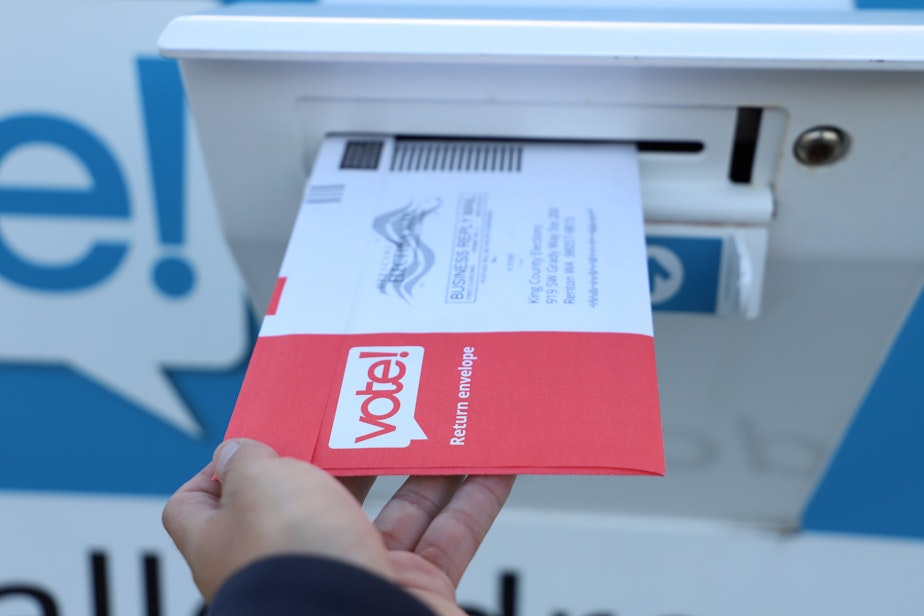6 tips for staying grounded during the 2024 election

It’s easy to feel overwhelmed by the flood of election headlines and opinions. But does following the news have to drive us crazy or even further apart?
A Braver Way podcast host Mónica Guzmán spoke with Isaac Saul, the founder of Tangle News — a political newsletter that’s earned trust across the political spectrum — to ask how we can take control of our news habits for a clearer, less polarizing view of the campaigns, the issues, and each other.
“I absolutely think that both the consumer and the news producers share responsibility in this, and I think it’s probably closer to [an] even split than a lot of people want to admit,” Saul said. “If you really, genuinely do want more policy discussion or more level-headed politics, the best way to get that to happen is to send signals to our news organizations that you want more of that content.”
Here are six tips for forming better news consumption habits that you can put into action today.
1. Search for a story from the opposite perspective
Sponsored
Instead of just accepting one media outlet’s take on an issue and moving on, intentionally type the opposite viewpoint into a search engine to find an article that highlights that. By reading counterarguments, we can check our assumptions, verify our own beliefs, and develop a more nuanced understanding of complex issues.
RELATED: Stressed about politics? Here are 5 ways to take care of your mental health
“Sometimes I’ll read the other thing and go, ‘Oh no — the original story I read is way more convincing, and this is not a compelling argument,” Saul said. “But oftentimes I’ll be very moved by the other piece in a way that kind of draws me back.”
2. Go straight to the source material when possible
Instead of reading an analysis of a debate, first go and watch the debate yourself to form your own opinion. If you don’t have time to watch it yourself, make sure to vary your recap sources to get a fuller picture. For instance, read a New York Times article as well as a Fox News article so you can catch any editorial bias and form your own opinion.
Sponsored
Similarly, if you are reading an article and it says “originally reported in X, Y, Z news source,” go to the original story instead.
“When you're a news organization that breaks a story, you're really careful with the language you use, how you explain the thing you know and the thing you don't know because there are all sorts of editorial standards,” Saul said. “But there are millions of other news outlets that aggregate content. And in that aggregation process, they will take certain elements of the story that fit their political narrative and agenda.”
3. Avoid speculative headlines
As one A Braver Way listener told us, “I don't read political stories that say that something may happen in the future.”
Headlines are designed to get clicks, and sometimes they speculate about a worst-case scenario to get them, Saul said. For instance, Bloomberg published a story in 2021 titled “Christmas at Risk as Supply Chain ‘Disaster’ Only Gets Worse.”
Sponsored
RELATED: A divided country agrees: The election is stressing everyone out
Spoiler alert: Christmas still happened!
4. Steer clear of generalizations and seek out nuanced stories
Black voters don’t all experience our country in the same way — nor does any other racial demographic. Try to observe tropes and generalizations that commonly occur in stories.
“Right now we are hearing all about the ‘Hispanic vote’ in this election, and Hispanic voters encompass everybody from Mexican Americans in Arizona to Cubans in South Florida,” Saul said. “And those cultures and political views are so different.”
Sponsored
Instead of generalities, seek out profile stories that follow real people in real places. Voters are complex and often hold contradictory views. Learning about them can help us see nuances we didn’t know existed and find new understanding about complicated issues.
5. Be honest with yourself about your motivations
Sometimes we find ourselves going down a rabbit hole, reading article after article about the same topic or news event. When this happens, ask yourself if your motivations have changed.
“As I reflect on it, I think sometimes my goal in finding more commentary is not to learn more about the situation, or to inform myself more,” Guzmán said. “It becomes, ‘I want to see the people who I think are at fault. I just want to see more people attack them.’”
RELATED: Worried about your 2024 ballot being counted? These states let you track it online
Sponsored
So ask yourself honestly: Am I still chasing this news story because I want to learn more, or because I want to see the other side attacked? If it’s the latter, it’s time to unplug.
6. Cap reading the news at a couple of hours
Saul caps his news consumption by shutting off the news completely after 6 p.m. most days, and he doesn’t look at the news at all on Saturdays.
Set boundaries that work for you and your lifestyle. If you need to know more about a given story or topic, you can spend another couple of hours catching up the next day.
“The world is not going to change because your opinion wasn’t fully formed on a Tuesday,” Saul said. “I hate to break it to you, but that’s just the reality of the situation.”
Listen to Mónica Guzmán's full interview with Isaac Saul here.
Want more tips for navigating election season? Check out A Braver Way podcast, which highlights real-life stories to help you face this election year without losing heart. Find us at braverangels.org/abraverway or wherever you get your podcasts. To join our text line, text “brave” to 206-926-9955.





